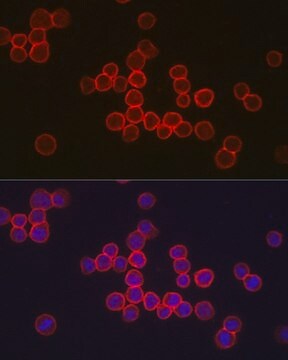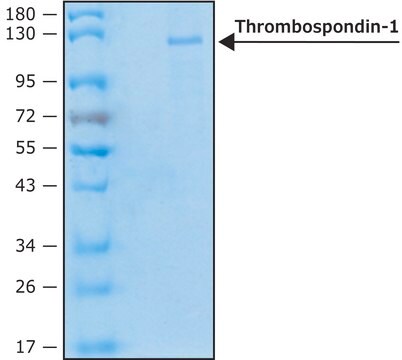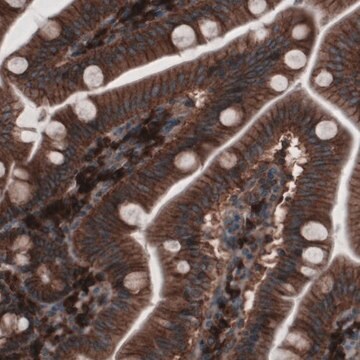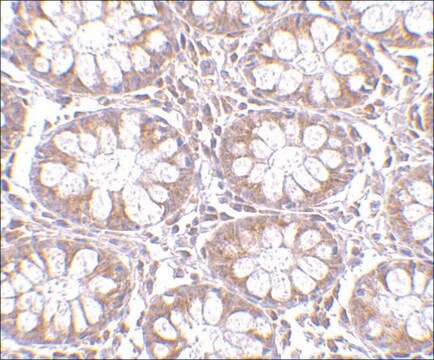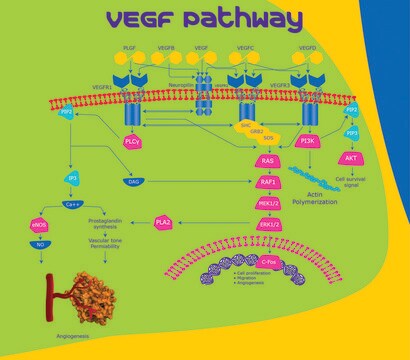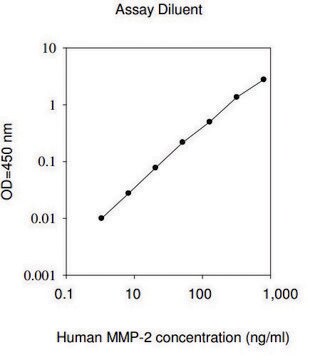추천 제품
생물학적 소스
rat
Quality Level
항체 형태
purified antibody
항체 생산 유형
primary antibodies
클론
273-34A, monoclonal
종 반응성
mouse, human
기술
ELISA: suitable
electron microscopy: suitable
immunohistochemistry (formalin-fixed, paraffin-embedded sections): suitable
immunoprecipitation (IP): suitable
동형
IgG2aκ
NCBI 수납 번호
UniProt 수납 번호
배송 상태
wet ice
타겟 번역 후 변형
unmodified
유전자 정보
human ... THBD(7056)
mouse ... Thbd(21824)
관련 카테고리
일반 설명
Thrombomodulin (UniProt P15306; also known as CD141, Fetomodulin, SnoRNA MBII-339, TM) is encoded by the Thbd gene (Gene ID 21824) in murine species. Thrombomodulin (TM) is an endothelial cell surface protein that function to suppress the propagation of thrombin (activated blood-coagulation factor II) generation by acting as a thrombin receptor. Formation of the TM-thrombin complex abolishes thrombin′s procoagulant activity by altering its substrate specificity, leading to proteolytic cleavage of protein C into the natural anticoagulant termed "activated protein C". Together with protein S, activated protein C proteolytically cleaves activated coagulation factors Va and VIIIa, thereby preventing the generation of activated coagulation factors Xa and thrombin. Murine thrombomodulin is initially produced with an N-terminal propeptide (a.a. 1-16) sequence, the removal of which yields the mature protein with a large extracellular region (a.a. 17-517), a transmembrane segment (a.a. 518-541), and a short cytoplamic tail (a.a. 542-577).
면역원
Epitope: Extracellular domain
Normal mouse lung microsomal fraction.
애플리케이션
Immunohistochemistry Analysis: A 1:50 dilution from a representative lot detected Thrombomodulin in human kidney tissue.
Immunoprecipitation Analysis: Representative lots immunoprecipitated the 112 kDa thrombomodulin from normal mouse lung fibroblasts (NMLF), but not Line 1 mouse lung carcinoma cells (Kennel, S.J., et al. (1988). Lab. Invest. 59(5):692-701; Kennel, S.J., et al. (1987). Exp. Mol. Pathol. 47(1):110-124).
Immunohistochemistry Analysis: A representative lot detected upregulated thrombomodulin immunoreactivity associated with the neoepidermis during wound healing using formalin-fixed, paraffin-embedded mouse skin sections (Peterson, J.J., et al. (1999). Am. J. Pathol. 155(5): 1569–1575).
Immunohistochemistry Analysis: Representative lots detected epithelium thrombomodulin immunoreactivity in paraffin-embedded mouse lung sections (Ford, V.A., et al. (1992). J. Biol. Chem. 267(8):5446-5450; Kennel, S.J., et al. (1987). Exp. Mol. Pathol. 47(1):110-124).
Immunohistochemistry Analysis: A representative lot detected thrombomodulin immunoreactivity associated with capillary endothelial cells by fluorescent immunohistochemistry using frozen mouse lung sections (Kennel, S.J., et al. (1987). Exp. Mol. Pathol. 47(1):110-124)
ELISA Analysis: Representative lots were used as the capture antibody for the detection of thrombomodulin in mouse tissue samples by sandwich ELISA using clone 411-201B (Cat. No. MABS1273) as the detection antibody, followed by an HRP-conjugated secondary antibody, or by sandwich radio-immunoassay using 125I-labeled clone 411-201B as the detection antibody (Isermann, B., et al. (2001). Development. 128(6):827-838; Conway, E.M., et al. (1999). Blood. 93(10):3442-3450; Weiler-Guettler, H., et al. (1996). Circ. Res. 78(2):180-187; Ford, V.A., et al. (1992). J. Biol. Chem. 267(8):5446-5450).
Electron Microscopy Analysis: Representative lots detected thrombomodulin immunoreactivity associated with capillary endothelial cells by EM using frozen mouse lung sections (Kennel, S.J., et al. (1988). Lab. Invest. 59(5):692-701; Kennel, S.J., et al. (1987). Exp. Mol. Pathol. 47(1):110-124).
Western Blotting Analysis: A representative lot detected purified thrombomodulin (P112) from normal mouse lung fibroblasts (NMLF) (Kennel, S.J., et al. (1988). Lab. Invest. 59(5):692-701).
Immunoprecipitation Analysis: Representative lots immunoprecipitated the 112 kDa thrombomodulin from normal mouse lung fibroblasts (NMLF), but not Line 1 mouse lung carcinoma cells (Kennel, S.J., et al. (1988). Lab. Invest. 59(5):692-701; Kennel, S.J., et al. (1987). Exp. Mol. Pathol. 47(1):110-124).
Immunohistochemistry Analysis: A representative lot detected upregulated thrombomodulin immunoreactivity associated with the neoepidermis during wound healing using formalin-fixed, paraffin-embedded mouse skin sections (Peterson, J.J., et al. (1999). Am. J. Pathol. 155(5): 1569–1575).
Immunohistochemistry Analysis: Representative lots detected epithelium thrombomodulin immunoreactivity in paraffin-embedded mouse lung sections (Ford, V.A., et al. (1992). J. Biol. Chem. 267(8):5446-5450; Kennel, S.J., et al. (1987). Exp. Mol. Pathol. 47(1):110-124).
Immunohistochemistry Analysis: A representative lot detected thrombomodulin immunoreactivity associated with capillary endothelial cells by fluorescent immunohistochemistry using frozen mouse lung sections (Kennel, S.J., et al. (1987). Exp. Mol. Pathol. 47(1):110-124)
ELISA Analysis: Representative lots were used as the capture antibody for the detection of thrombomodulin in mouse tissue samples by sandwich ELISA using clone 411-201B (Cat. No. MABS1273) as the detection antibody, followed by an HRP-conjugated secondary antibody, or by sandwich radio-immunoassay using 125I-labeled clone 411-201B as the detection antibody (Isermann, B., et al. (2001). Development. 128(6):827-838; Conway, E.M., et al. (1999). Blood. 93(10):3442-3450; Weiler-Guettler, H., et al. (1996). Circ. Res. 78(2):180-187; Ford, V.A., et al. (1992). J. Biol. Chem. 267(8):5446-5450).
Electron Microscopy Analysis: Representative lots detected thrombomodulin immunoreactivity associated with capillary endothelial cells by EM using frozen mouse lung sections (Kennel, S.J., et al. (1988). Lab. Invest. 59(5):692-701; Kennel, S.J., et al. (1987). Exp. Mol. Pathol. 47(1):110-124).
Western Blotting Analysis: A representative lot detected purified thrombomodulin (P112) from normal mouse lung fibroblasts (NMLF) (Kennel, S.J., et al. (1988). Lab. Invest. 59(5):692-701).
Research Category
Signaling
Signaling
Research Sub Category
Signaling Neuroscience
Signaling Neuroscience
This Anti-Thrombomodulin Antibody, clone 273-34A is validated for use in Immunohistochemistry, Immunoprecipitation, Immunohistochemistry (Paraffin), ELISA, Electron Microscopy for the detection of Thrombomodulin.
품질
Evaluated by Immunohistochemistry in mouse heart tissue.
Immunohistochemistry Analysis: A 1:50 dilution of this antibody detected Thrombomodulin in mouse heart tissue.
Immunohistochemistry Analysis: A 1:50 dilution of this antibody detected Thrombomodulin in mouse heart tissue.
표적 설명
~ 62 kDa calculated
물리적 형태
Format: Purified
Protein G Purified
Purified rat monoclonal IgG2aκ antibody in buffer containing 0.1 M Tris-Glycine (pH 7.4), 150 mM NaCl with 0.05% sodium azide.
저장 및 안정성
Stable for 1 year at 2-8°C from date of receipt.
기타 정보
Concentration: Please refer to lot specific datasheet.
면책조항
Unless otherwise stated in our catalog or other company documentation accompanying the product(s), our products are intended for research use only and are not to be used for any other purpose, which includes but is not limited to, unauthorized commercial uses, in vitro diagnostic uses, ex vivo or in vivo therapeutic uses or any type of consumption or application to humans or animals.
적합한 제품을 찾을 수 없으신가요?
당사의 제품 선택기 도구.을(를) 시도해 보세요.
Storage Class Code
12 - Non Combustible Liquids
WGK
WGK 2
Flash Point (°F)
Not applicable
Flash Point (°C)
Not applicable
시험 성적서(COA)
제품의 로트/배치 번호를 입력하여 시험 성적서(COA)을 검색하십시오. 로트 및 배치 번호는 제품 라벨에 있는 ‘로트’ 또는 ‘배치’라는 용어 뒤에서 찾을 수 있습니다.
V A Ford et al.
The Journal of biological chemistry, 267(8), 5446-5450 (1992-03-15)
Previously, two rat monoclonal antibodies where developed which bind distinct epitopes on a murine glycoprotein, P112, which is expressed primarily in lung capillary endothelium. In this paper we show that P112 is identical to the endothelial anticoagulant protein, thrombomodulin (TM).
E M Conway et al.
Blood, 93(10), 3442-3450 (1999-05-11)
Thrombomodulin (TM) is a widely expressed glycoprotein receptor that plays a physiologically important role in maintaining normal hemostatic balance postnatally. Inactivation of the TM gene in mice results in embryonic lethality without thrombosis, suggesting that structures of TM not recognized
K V Kesari et al.
Clinical and experimental immunology, 118(2), 219-227 (1999-11-11)
Ulcerative colitis (UC) is associated with autoantibody response to a cytoskeletal protein, human tropomyosin (hTM) isoform-5 (hTM5). Because hTM5 is an intracellular protein, it may remain inaccessible to the autoantibodies. Therefore, we have investigated the possibility of externalization of hTM5
B Isermann et al.
Development (Cambridge, England), 128(6), 827-838 (2001-02-27)
The endothelial cell surface receptor thrombomodulin (TM) inhibits blood coagulation by forming a complex with thrombin, which then converts protein C into the natural anticoagulant, activated protein C. In mice, a loss of TM function causes embryonic lethality at day
S J Kennel et al.
Experimental and molecular pathology, 47(1), 110-124 (1987-08-01)
Six rat monoclonal antibodies to mouse lung membrane fraction have been characterized. Each has unique binding properties and can be used to stain particular lung components in paraffin sections. One antibody, 133-13A, recognizes a 100-kDa glycoprotein on lung tumor cells
자사의 과학자팀은 생명 과학, 재료 과학, 화학 합성, 크로마토그래피, 분석 및 기타 많은 영역을 포함한 모든 과학 분야에 경험이 있습니다..
고객지원팀으로 연락바랍니다.